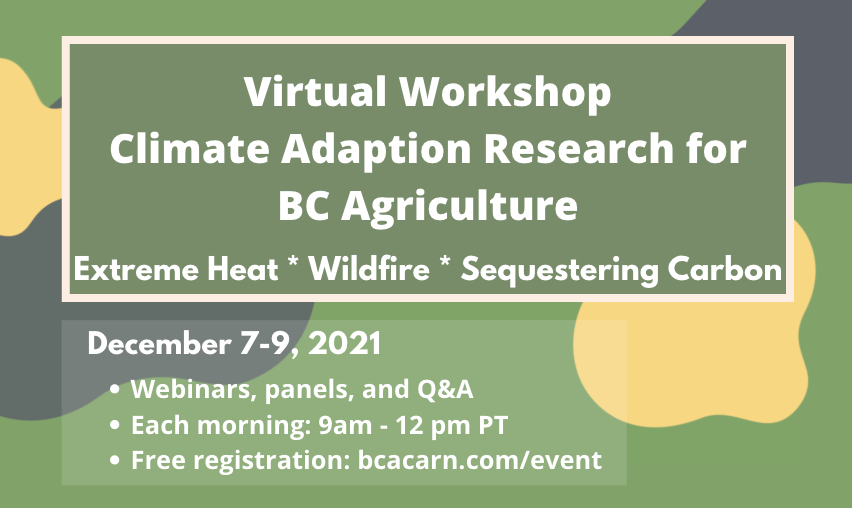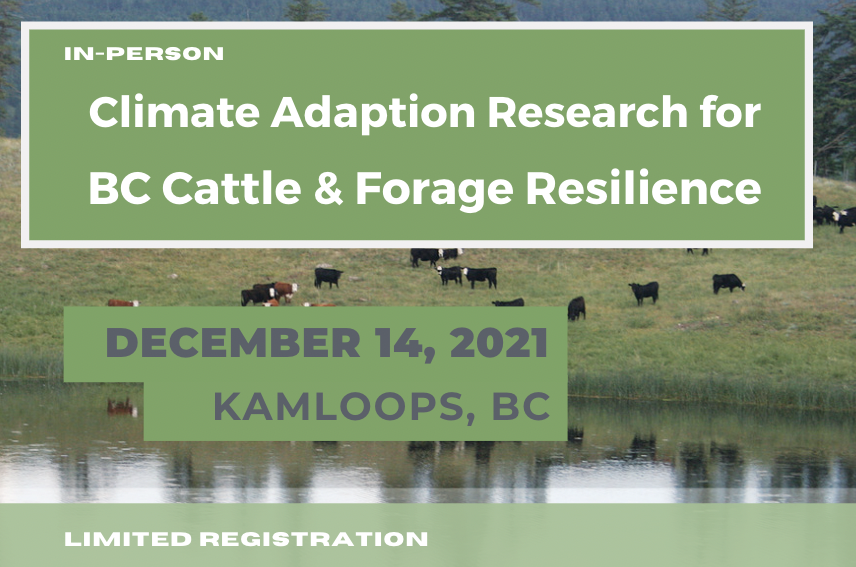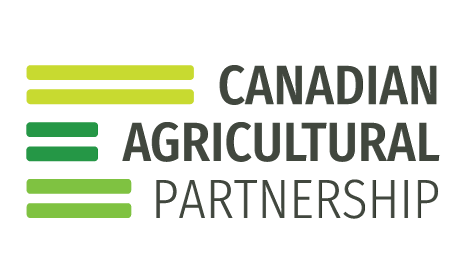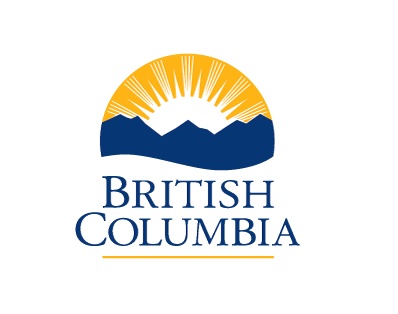
Adaptation Research Virtual Workshop 2021
Join presenters and participants from across British Columbia and beyond for three mornings (Pacific time) on December 7th – 9th. We will be discussing some of the biggest climate challenges and opportunities for agriculture:
- Extreme heat and drought
- Wildfire risk and recovery
- Carbon sequestration
There is no cost to participate, but registration is required. REGISTER HERE.
Workshop Program
Extreme Heat & Drought
Webinar: 9-10am PST
Warning Issued: The June, 2021 Heatwave
Faron Anslow, Lead, Climate Analysis and Monitoring, Pacific Climate Impacts Consortium
This presentation will provide an analysis of the June, 2021 western North America heatwave; setting it in the historical and future contexts of extreme heat for British Columbia.
A Review of the 2021 Western Canadian Drought
Trevor Hadwen, Agroclimate Specialist, Agriculture and Agri-Food Canada
Drought is one of the world’s most significant natural hazards, having major impacts on the economy, environment, health, and society. The 2021 Western Canadian drought represents the most severe and expansive drought in more than a generation. This presentation will review the conditions that lead to the 2021 drought, discuss the unique features that made this drought rate as one of the worst droughts in more than 50 years and consider some of the potential implications for the 2022 growing season.
Panel: 10:30am-12pm PST
Extreme heat & drought: Impacts & adaptation
This panel will look at four producers' perspectives (from the dairy, berry, ranching and tree fruit sectors) on the extreme heat and drought experienced across the province this past summer. Producers from these four unique commodity groups, and from different parts of B.C., will discuss how their operations were affected, how they adapted to persevere through these challenges, and what they found surprising about how their crops or livestock responded to these climate extremes. Panelists will also discuss what made adaptation possible for them, and /or what constrained their ability to adapt. Data gaps, research and infrastructure needs to bridge identified constraints to adaptation will be highlighted.
Wildfire: Risk, Management & Recovery
Webinar: 9-10am PST
Climate change and wildfire – what does the future look like?
Dr. Mike Flannigan, Research Chair of Predictive Services, Emergency Management & Fire Science, Thompson Rivers University and Scientific Director, Canadian Partnership for Wildland Fire Science
Wildfires are a frequent occurrence in many regions of the world. These fires are the result of interactions between climate/weather, fuels (vegetation – grass, leaves, needles, shrubs etc.), and people. Our climate and associated day-to-day weather are changing rapidly due to human activities that may have dramatic and unexpected impacts on regional and global fire activity. A warmer world means a longer fire season, more lightning activity, and most importantly drier fuels. Drier fuels means it is easier for a fire to start and to spread, and it means more fuel is available to burn that leads to higher intensity fires that are difficult to impossible to extinguish. Existing studies suggest regional increases in fire occurrence and area burned and this includes British Columbia. Climate change will likely mean more wildfire in the future for many regions of the world. We will have to learn to live with wildfire.
Wildfire Risk Reduction Through Targeted Grazing
Amanda J Miller, Principal Ecologist, Palouse Rangeland Consulting/ BC Cattlemen's Association
The British Columbia Cattlemen’s Association has partnered with the Province of British Columbia to develop a pilot program with the intent to reduce wildfire risk in BC’s wildland/urban interface by managing fuel with targeted grazing, while maintaining ecological and multiple use values.
During recent fire seasons the value of agricultural practices, notably grazing, was evident in changing fire behaviour by helping slow, turn, or stop fires from moving across the landscape. In this pilot program, targeted cattle grazing will be used to reduce fine fuel loads and subsequently wildfire risk and intensities adjacent to communities, utilities, and transportation corridors.
Panel: 10:30am-12pm PST
Wildfire Recovery and Resilience
This panel will bring together the experience of four individuals with distinct sets of knowledge and experience with respect to wildfire recovery, resilience and preparedness. Dr. Sonya Leverkus will speak about prescribed fire burn planning, patch burning systems and her work with the agricultural sector on private and crown land. Wylie Bystedt will discuss the role of a wildfire disaster recovery specialist at the farm, family and community level. Mike Pritchard will share his experience piloting virtual fencing as an alternative to traditional fencing and its connection to preparedness. Other researchers will share their knowledge of forest management to reduce wildfire risk as it applies to the agriculture interface.
Carbon Sequestration: Potential to Practice
Webinar: 9-10am PST
Carbon sequestration potential in western Canada using grasslands, grazing and agroforestry
Dr. Edward Bork, Mattheis Chair in Rangeland Ecology in Management & Director, Rangeland Research Institute, University of Alberta
Agriculture is responsible for a significant amount of greenhouse gases (GHG), and much interest exists in understanding how agriculture may facilitate carbon (C) storage and GHG mitigation. Here I review the results of ongoing research examining the role of Alberta grasslands and agroforestry systems for storing carbon. Grasslands are a large storehouse of C (conservatively 60-180+ t/ha-C) situated in various ecosystem components (vegetation, litter/mulch, and soil). The greatest threat to these C stocks is land use conversion, which represents the loss of >$20 B Cdn in sequestered carbon. Grazing can fine tune C stocks, in part due to changes in plant composition and nutrient cycling. Agroforestry systems also store large amounts of C, with forest loss leading to marked reductions in C. Policies are needed to properly value the C in perennial grasslands and forests, and thereby promote their conservation on private lands.
Rangeland Management: Cows and Carbon
Dr. Lauchlan Fraser, Professor and NSERC Industrial Research Chair in Ecosystem Reclamation, Thompson Rivers University
British Columbia has experienced a rise of approximately 1.5 C mean annual surface temperature over the past 50 years. In addition to continuing temperature increase, a shifting of precipitation patterns is expected with longer and more frequent droughts. As a result, BC cattle producers must practice adaptation to manage rangelands affected by present and future climate change. I will be presenting research that tests grazing management practices for enhanced soil carbon sequestration, and sustainable grasslands.
Panel: 10:30am-12pm PST
Carbon sequestration: From on-farm implementation to verification
This panel will answer questions about how the agricultural sector can play a role in carbon sequestration. Experts in the field from the Canadian Forage and Grasslands Association, the B.C. Farmland Advantage program, agricultural industry practitioners from out of province and the federal government will speak about how agricultural carbon sequestration can be monitored, measured and verified and the potential for agricultural lands to contribute to national climate change mitigation efforts. The discussion will also identify barriers to implementation, what is being done to overcome them and opportunities for producers looking to apply this practice to their operation.
Speaker Bios
Faron Anslow is a climatologist who leads the Climate Analysis and Monitoring theme at PCIC. Characterizes BC's climate history and extreme events in the context of climate expectations.
Trevor Hadwen is an Agroclimate Specialist with Agriculture and Agri-Food Canada’s National Agroclimate Information Service. Among leading a variety of climate monitoring, assessment, and reporting activities, Trevor is the lead for the Canadian Drought Monitor. Trevor represents Canada on the World Metrological Organization Integrated Drought Management Programme and the Intergovernmental Working Group on Drought with the UN Convention to Combat Desertification (UNCCD). Trevor’s work also includes a long history of the development of extreme climate indicators and assessment tools that help anticipate and mitigate the impact of extreme climate events.
Dr. Mike Flannigan is the Research Chair of Predictive Services, Emergency Management and Fire Science at Thompson Rivers University and the Scientific Director of the Canadian Partnership for Wildland Fire Science. He has been studying fire and weather/climate interactions including the potential impact of climatic change, lightning-ignited forest fires for over 40 years.
Amanda Miller is passionate about rangeland stewardship and conservation, with a keen interest in providing ecological tools and strategies for long term sustainable land management. Applied science, extension, and effective communication with stakeholders and land managers are key areas of interest. Amanda has a Master’s degree in Rangeland and Wildlife Resources from the University of Alberta and has been a professional agrologist since 2016. The owner of Palouse Rangeland Consulting, Amanda is a supporter of sustainable beef and cattle as a conservation tool. In her free time you can find her exploring the mountains by foot, on skis, or horseback.
Dr. Edward Bork is the Mattheis Chair in Rangeland Ecology in Management, and Director of the Rangeland Research Institute at the University of Alberta. He has been teaching and conducting research for more than 25 years on basic and applied topics, including integrated weed control, grazing systems, fire ecology, forage production, agro-forestry, and recently, the role of rangelands in providing alternative ecosystem goods and services, including carbon storage, greenhouse gas reduction and biodiversity retention. He has supervised 48 graduate students, including 11 PhD students. Dr. Bork maintains close ties with the agriculture industry, and has given numerous extension talks.
Dr. Lauchlan Fraser is a Professor and NSERC Industrial Research Chair in Ecosystem Reclamation and former Canada Research Chair in Community and Ecosystem Ecology at Thompson Rivers University (TRU), Canada. Dr. Fraser’s expertise is in grassland and wetland ecosystems, with a focus on range management, climate change, biodiversity, and ecosystem reclamation. Lauch is an Associate Editor of two academic journals (Applied Vegetation Science and Plant Ecology), sits on the board of the Grasslands Conservation Council and is a member of a number of professional international associations and research networks.

Following the virtual workshop, we will be hosting a small in-person session in Kamloops focused on adaptation, mitigation and resilience in the BC cattle and forage sector.
Funding Acknowledgement


